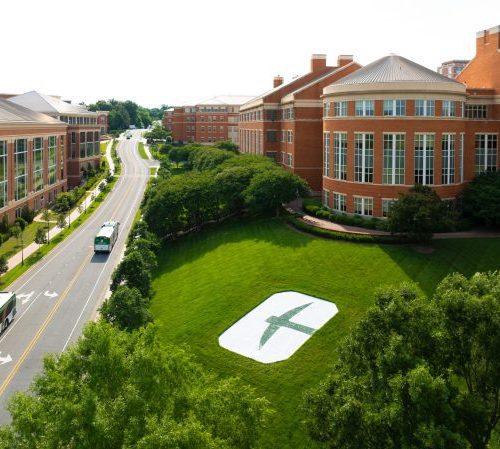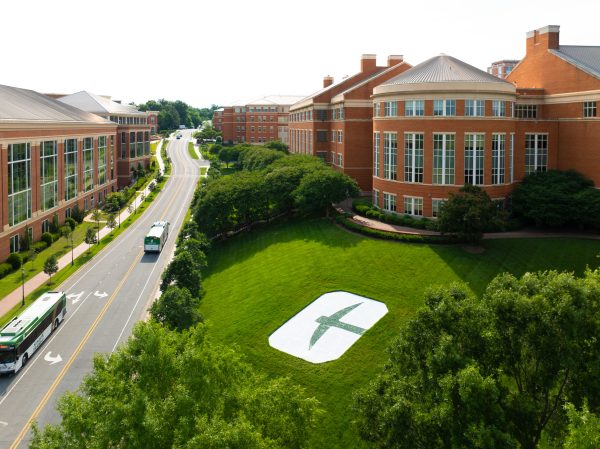Engineering North Carolina’s Future is driving tech, energy and innovation at UNC Charlotte


UNC Charlotte is taking the lead in preparing highly skilled engineers, computer and data scientists and STEM professionals key to North Carolina’s continued rise in technology, energy and advanced manufacturing. Support comes from Engineering North Carolina’s Future, an initiative backed by a $41.2 million investment in the University by the North Carolina General Assembly.
Charlotte has used the state funding, awarded in two phases in 2021 and 2023, to:
- Invest in faculty in the William States Lee College of Engineering, the College of Computing and Informatics and the School of Data Science — areas of growth for the University
- Create a first-of-its-kind, globally networked learning and research space, renovate existing facilities and add additional equipment and technology
- Start a Ph.D. program in data science
“Our students are learning from some of the top faculty in the country, educators whose teaching and research are advancing industry priorities and strengthening North Carolina’s workforce,” said Jennifer Troyer, provost and vice chancellor for academic affairs. “Their expertise ensures that Charlotte will continue to produce the engineering, technology and energy talent our region and state needs now and in the future.”
Driving student enrollment increases
Engineering North Carolina’s Future support has yielded increased student enrollment and research at UNC Charlotte. The combined enrollment for the College of Computing and Informatics and the W.S. Lee College of Engineering this fall is 8,671, a 16.8% increase over fall 2022, after the first funds were received. That includes an enrollment of 1,526 first-time college students — a 41.5% increase from the start of the initiative and up 13% compared with fall 2024.
Driving the colleges’ growth are positions to support the Engineering North Carolina’s Future initiative to recruit prospective students and increase enrollment. The W.S. Lee College of Engineering hired two professional academic advisors for first-year students and added student workers to the college ambassador program. The College of Computing and Informatics hired two advisors for its Undergraduate Advising Center and added Carmalita Govan, its director of professional education for graduate studies.
Investing in faculty and staff
The University added 39 new positions using state funding. That includes nine new faculty members in the W.S. Lee College of Engineering and 18 in the College of Computing and Informatics and the School of Data Science. Eleven staff positions supporting student success were added across the colleges as well as a leadership position in the W.S. Lee College of Engineering — Asis Nasipuri, associate dean for faculty affairs.
The total investment for these positions is over $4.8 million.
The new positions are driving student success through teaching and innovation, including expanded hands-on training opportunities, increased recruitment and retention efforts and, in engineering, a new common first-year curriculum.
Engineering North Carolina’s Future is powering faculty research, expanding opportunities for new studies and breakthroughs at UNC Charlotte. Faculty research at Charlotte made possible through state funding includes:
- Shawn Chen, assistant professor of mechanical engineering, is unraveling the complexity of ion-conductive materials, supporting more efficient energy storage solutions. Chen’s research, which recently won an NSF Career Award, holds implications for commercialized products like solar panels and other renewable energy materials.
- Angelo Gaitas, associate professor of electrical and computer engineering, develops micro and nano sensors that measure heat, mechanics and electrical activity inside single cells. His lab’s tools — including microneedle thermometers, fluidic microcantilevers and patch-clamp systems — help reveal how temperature, physical forces, growth rates and drug responses shape cell behavior. With over $2 million in active NSF and NIH grants, including an NSF CAREER Award, Gaitas’ work advances applications in medical diagnostics, disease research and cell therapy.
- Marco Vieira, professor of computer science, conducts influential cybersecurity research focused on dependability and security assessment in computing systems. His work involves benchmarking, fault injection, failure prediction and software testing. He is particularly interested in high-impact research areas such as cyber defense, dependable computing and autonomous systems. Vieira has authored hundreds of papers on these critical subjects and serves as chair of the International Federation for Information Processing’s Working Group on Dependable Computing and Fault Tolerance.
- Miranda Parker, assistant professor of software and information systems, specializes in computing education research. Her projects center on developing and validating novel computer science assessment tools for introductory and elementary computing students with the goal of developing low-cost interventions to increase access to rigorous computer science instruction for all students.
- Hongfei Xue, assistant professor of computer science, conducts research at the intersection of the “Internet of Things” and artificial intelligence with an emphasis on building intelligent wireless sensing systems. His research involves developing advanced algorithms and systems designed to collect, integrate and analyze sensory data measured by internet-connected “smart” devices, ultimately transforming it into useful knowledge for a better understanding of the world.
The research funding increase in W.S. Lee College of Engineering and the College of Computing and Informatics due to Engineering North Carolina’s Future support is nearly $4.5 million.
Powering a national first
A $1.5 million Engineering North Carolina’s Future investment helped UNC Charlotte become the first public university in the U.S. to establish a globally networked Super Fab Lab, a digital fabrication laboratory for creativity, mentorship, invention and industry partnerships.
This fall is the first time the Charlotte Super Fab Lab, which had a soft opening in March, is being integrated into the curriculum. Currently in Kennedy Hall and available for use by engineering and computing and informatics students, it eventually will be open to all Charlotte students.
The Charlotte Super Fab Lab’s future home is the Burson Building, and $30 million in Engineering North Carolina’s Future support will help expand Burson, creating a new teaching and interdisciplinary research hub for the W.S. Lee College of Engineering, the College of Computing and Informatics and the School of Data Science.
Engineering faculty and staff hires for the Charlotte Super Fab Lab are expanding this hands-on training facility to support innovation in manufacturing. The support also provides stipends for Charlotte Super Fab Lab student lab workers to provide hands-on training while helping to reduce student debt.
Charlotte Super Fab Lab Director Terence Fagan, whose role was made possible by Engineering North Carolina’s Future funding, has been an integral partner with the city of Charlotte as it took the pledge to be a Fab City.
Additional renovations to existing facilities include the University’s:
- North Carolina Battery Complexity, Autonomous Vehicle and Electrification Research Center, or BATT CAVE, which supports new research, attracts new industry partnerships and provides opportunities for an expanding curriculum in battery engineering and aerospace engineering.
- Industrial Solutions Lab powered by Lilly, that brings together students and industrial partners to tackle real-world engineering projects for 45 of W.S. Lee College’s over 300 industry partners per year.
Supporting a new Ph.D. program
This August, the School of Data Science welcomed its first cohort of students to its new Ph.D. in data science program, the first of its kind in the Carolinas.
Approved by the UNC System Board of Governors in May 2024 and established in response to the skyrocketing growth of the data science industry in North Carolina and globally, the doctorate offers training for future industry leaders and university educators.
Engineering North Carolina’s Future funding is covering graduate assistantships for six of the 10 doctoral students enrolled in the transdisciplinary program, which emphasizes the core technical skills of machine learning, artificial intelligence and statistics along with the social implications and ethics of data use.
These investments in faculty, programs and facilities not only make Charlotte different, but they make it the urban research university in North Carolina’s fastest-growing city.